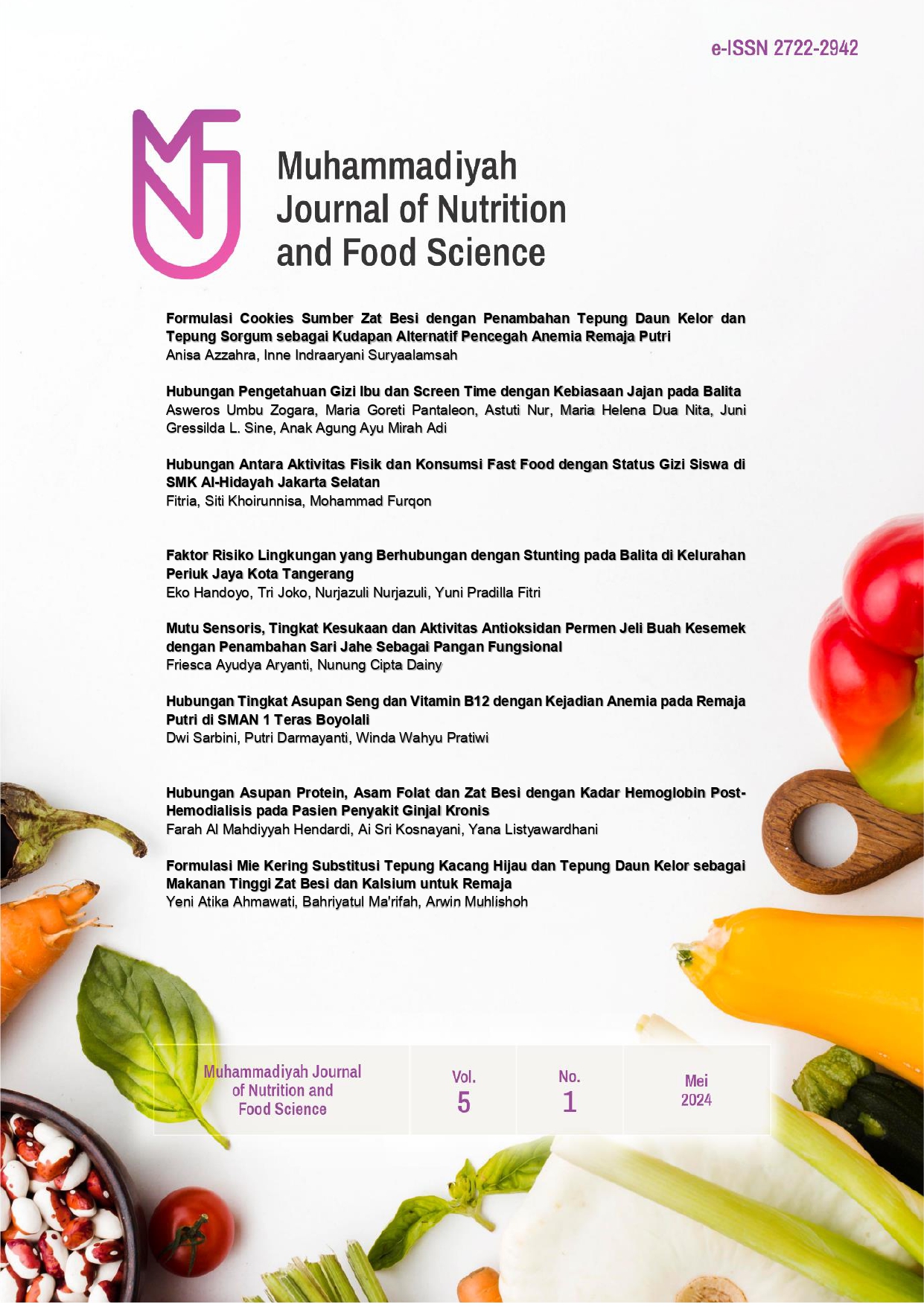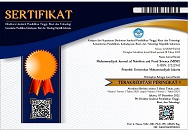Hubungan Pengetahuan Gizi Ibu dan Screen Time dengan Kebiasaan Jajan pada Balita
DOI:
https://doi.org/10.24853/mjnf.5.1.13-21Keywords:
kebiasaan jajan, pengetahuan gizi, screen timeAbstract
Latar Belakang: Konsumsi jajanan dilakukan oleh semua individu, termasuk balita. Konsumsi jajanan secara berlebihan akan berdampak pada kesehatan. Faktor-faktor yang berhubungan dengan konsumsi jajanan pada balita adalah pengetahuan gizi ibu dan screen time. Ibu berpengetahuan gizi baik cenderung memberikan makanan yang sehat dan bergizi kepada anaknya. Penggunaan screen time yang lama akan meningkatkan konsumsi jajanan. Tujuan: menganalisis hubungan pengetahuan gizi ibu dan screen time dengan kebiasaan jajan pada balita. Metode: Penelitian ini dilaksanakan di Kota Kupang pada bulan Maret sampai Juni 2023. Sampel dalam penelitian ini adalah balita berumur 24-59 bulan berjumlah 366 orang. Data penelitian dianalisis menggunakan uji chi square. Hasil: Pengetahuan gizi ibu masih kurang (56,6%) dan screen time pada balita cukup tinggi, yaitu ≥2 jam per hari (77,9%). Hasil uji statistik menunjukkan ada hubungan yang signifikan antara pengetahuan gizi ibu dan screen time dengan kebiasaan jajan pada balita (p value = 0,000). Simpulan: Ada hubungan signifikan antara pengetahuan gizi ibu dan screen time dengan kebiasaan jajan pada balita.References
Almoraie NM, Saqaan R, Alharthi R, Alamoudi A, Badh L, Shatwan IM. Snacking patterns throughout the life span: potential implications on health. Nutr Res. 2021;91:81–94.
Nuru H, Mamang F. Association between snacking and obesity in children: a review. Int J Community Med Public Heal. 2015;2(3).
Wang D, Van Der Horst K, Jacquier EF, Afeiche MC, Eldridge AL. Snacking patterns in children: A comparison between Australia, China, Mexico, and the US. Nutrients. 2018;10(2):1–14.
Nordhagen S, Pries AM, Dissieka R. Commercial snack food and beverage consumption prevalence among children 6–59 months in West Africa. Nutrients. 2019;11(11).
Barnes TL, French SA, Harnack LJ, Mitchell NR, Wolfson J. Snacking Behaviors, Diet Quality, and Body Mass Index in a Community Sample of Working Adults. J Acad Nutr Diet. 2015;115(7):1117–23.
Nicklaus S. Complementary feeding strategies to facilitate acceptance of fruits and vegetables: A narrative review of the literature. Int J Environ Res Public Health. 2016;13(11).
DeJesus JM, Kinzler KD, Shutts K. Food cognition and nutrition knowledge. Pediatric Food Preferences and Eating Behaviors. Elsevier Inc.; 2018. 271–288 p.
Jones BL. Making time for family meals: Parental influences, home eating environments, barriers and protective factors. Physiol Behav. 2018;193:248–51.
Kachurak A, Davey A, Bailey RL, Fisher JO. Daily Snacking Occasions and Weight Status Among US Children Aged 1 to 5 Years. Obesity. 2018;26(6):1034–42.
Romanos-Nanclares A, Zazpe I, Santiago S, Marín L, Rico-Campà A, Martín-Calvo N. Influence of parental healthy-eating attitudes and nutritional knowledge on nutritional adequacy and diet quality among preschoolers: The Sendo project. Nutrients. 2018;10(12).
El-Nmer F, Salama AA, Elhawary D. Nutritional knowledge, attitude, and practice of parents and its impact on growth of their children. Menoufia Med J. 2014;27(3):612–6.
Yabancı N, Kısaç İ, Karakuş SŞ. The Effects of Mother’s Nutritional Knowledge on Attitudes and Behaviors of Children about Nutrition. Procedia - Soc Behav Sci. 2014;116:4477–81.
Gibson EL, Androutsos O, Moreno L, Flores-Barrantes P, Socha P, Iotova V, et al. Influences of parental snacking-related attitudes, behaviours and nutritional knowledge on young children’s healthy and unhealthy snacking: The ToyBox study. Nutrients. 2020;12(2):1–17.
Stiglic N, Viner RM. Effects of screen time on the health and well-being of children and adolescents: A systematic review of reviews. BMJ Open. 2019;9(1).
Lauricella AR, Wartella E, Rideout VJ. Young children’s screen time: The complex role of parent and child factors. J Appl Dev Psychol. 2015;36:11–7.
Huo J, Kuang X, Xi Y, Xiang C, Yong C, Liang J, et al. Screen Time and Its Association with Vegetables, Fruits, Snacks and Sugary Sweetened Beverages Intake among Chinese Preschool Children in Changsha, Hunan Province: A Cross-Sectional Study. Nutrients. 2022;14(19).
Kabali HK, Irigoyen MM, Nunez-Davis R, Budacki JG, Mohanty SH, Leister KP, et al. Exposure and use of mobile media devices by young children. Pediatrics. 2015;136(6):1044–50.
Kelishadi R, Mozafarian N, Qorbani M, Maracy MR, Motlagh ME, Safiri S, et al. Association between screen time and snack consumption in children and adolescents: The CASPIAN-IV study. J Pediatr Endocrinol Metab. 2017;30(2):211–9.
Shqair AQ, Pauli LA, Costa VPP, Cenci M, Goettems ML. Screen time, dietary patterns and intake of potentially cariogenic food in children: A systematic review. J Dent. 2019;86:17–26.
Pyper E, Harrington D, Manson H. The impact of different types of parental support behaviours on child physical activity, healthy eating, and screen time: A cross-sectional study. BMC Public Health. 2016;16(1):1–15.
Börnhorst C, Wijnhoven TMA, Kunešová M, Yngve A, Rito AI, Lissner L, et al. WHO European Childhood Obesity Surveillance Initiative: Associations between sleep duration, screen time and food consumption frequencies. BMC Public Health. 2015;15(1).
Zogara AU, Loaloka MS, Pantaleon MG. Faktor Ibu dan Waktu Pemberian MPASI Berhubungan dengan Status Gizi Balita di Kabupaten Kupang. J Nutr Coll. 2021;10(1):55–61.
Shang L, Wang JW, O’Loughlin J, Tremblay A, Mathieu MÈ, Henderson M, et al. Screen time is associated with dietary intake in overweight Canadian children. Prev Med Reports. 2015;2:265–9.
Marangoni F, Martini D, Scaglioni S, Sculati M, Donini LM, Leonardi F, et al. Snacking in nutrition and health. Int J Food Sci Nutr. 2019;70(8):909–23.
Hirvonen K, Hoddinott J, Minten B, Stifel D. Children’s Diets, Nutrition Knowledge, and Access to Markets. World Dev. 2017;95:303–15.
Almeida C, Azevedo J, Rio MJG, Barros R, Severo M, Padraõ P. Parental practices, preferences, skills and attitudes on food consumption of pre-school children: Results from Nutriscience Project. PLoS One. 2021;16(5):1–18.
Peters J, Parletta N, Lynch J, Campbell K. A comparison of parental views of their pre-school children’s “healthy” versus “unhealthy” diets. A qualitative study. Appetite. 2014;76:129–36.
Olusegun F, Amare M, Mavrotas. G, Akerele D, Ogunniyi A. Mother’s nutrition-related knowledge and child nutrition outcomes: Empirical evidence from Nigeria. PLoS One. 2019;14:1–17.
Niermann CYN, Spengler S, Gubbels JS. Physical Activity, Screen Time, and Dietary Intake in Families: A Cluster-Analysis With Mother-Father-Child Triads. Front Public Heal. 2018;6:1–12.
Cartanyà-Hueso À, González-Marrón A, Lidón-Moyano C, Garcia-Palomo E, Martín-Sánchez JC, Martínez-Sánchez JM. Association between leisure screen time and junk food intake in a nationwide representative sample of Spanish children (1–14 years): A cross-sectional study. Healthcare. 2021;9(2):1–10.
Avery A, Anderson C, McCullough F. Associations between children’s diet quality and watching television during meal or snack consumption: A systematic review. Matern Child Nutr. 2017;13(4).
Lee B, Kim H, Lee SK, Yoon J, Chung SJ. Effects of exposure to television advertising for energy-dense/nutrient-poor food on children’s food intake and obesity in South Korea. Appetite. 2014;81:305–11.
Kelly B, Freeman B, King L, Chapman K, Baur LA, Gill T. Television advertising, not viewing, is associated with negative dietary patterns in children. Pediatr Obes. 2016;11(2):158–60.
Schmidt SCE, Anedda B, Burchartz A, Eichsteller A, Kolb S, Nigg C, et al. Physical activity and screen time of children and adolescents before and during the COVID-19 lockdown in Germany: a natural experiment. Sci Rep. 2020;10(1):1–12.
Folkvord F, Hermans RCJ. Food Marketing in an Obesogenic Environment: a Narrative Overview of the Potential of Healthy Food Promotion to Children and Adults. Curr Addict Reports. 2020;7(4):431–6.
Smith R, Kelly B, Yeatman H. Food Marketing Influences Children ’ s Attitudes , Critical Review. Nutrients. 2019;11(4):875.
Backholer K, Gupta A, Zorbas C, Bennett R, Huse O, Chung A, et al. Differential exposure to, and potential impact of, unhealthy advertising to children by socio-economic and ethnic groups: A systematic review of the evidence. Obes Rev. 2021;22(3).
Correa T, Reyes M, Taillie LS, Corvalán C, Dillman Carpentier FR. Food Advertising on Television before and after a National Unhealthy Food Marketing Regulation in Chile, 2016–2017. Am J Public Health. 2020;110(7):1054–9.
Boyland EJ, Whalen R. Food advertising to children and its effects on diet: Review of recent prevalence and impact data. Pediatr Diabetes. 2015;16(5):331–7.
Downloads
Published
Issue
Section
License
(c) 2020 MJNF







